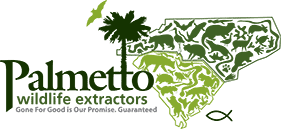
While a poisonous bite from a snake in the United States rarely results in death, many snake bites may prove to be potentially lethal. At the very least, these bites could result in the onset of potentially life-threatening infections, may result in detriment to the central nervous system, and may cause problems with many normal functions of the body.
The State of South Carolina has approximately 38 different species of snakes. Of these, a total of five are considered to be venomous. These include the cottonmouth snake, the copperhead snake, the coral snake, the Eastern diamondback rattlesnake, the pigmy rattlesnake, and the timber rattlesnake. In this guide, you will learn about the top three venomous snakes.
The Cottonmouth Snake
The cottonmouth snake is often called a “water moccasin”. In all of North America, this is the only water snake that is venomous. The head is blocky and triangular shaped. The body is very thick. The name “cottonmouth” stems from the white color within the mouth of the reptile.
These snakes are found around bodies of water – such as swamps and streams – as well as wetland regions throughout the state. The reptile’s diet consists of other reptiles, insects, rodents, and amphibians. While considered to be aggressive, these snakes rarely bite people. If a person does receive a bite, the venom will break down the blood cells and the following may occur:
- Temporary or permanent damage to the tissues
- Temporary or permanent damage to the muscles
- Internal bleeding
- Extreme pain
- Loss of Extremity
The Eastern Diamondback Rattlesnake
The Eastern diamondback rattlesnake is considered to be the absolute largest of all venomous snakes within North America. These reptiles may grow as large as eight feet and may weigh as much as ten pounds. These reptiles are typically found in pine flatwoods, coastal habitats, woodlands that are sandy, and areas that are dry.
The diamond pattern on the snake is bordered in yellow and has a black center. Their diet consists of birds, rats, mice, and squirrels. While aggressive and potentially deadly, these reptiles will usually only attack humans as a defensive measure. When striking, they may do so up to a third of their overall length. The bites rarely result in death due to high levels of available anti-venin; however, the venom may result in the following:
- Puncture marks on the skin
- Numbness
- Weakness
- Lightheadedness
- Nausea
- Vomiting
- Sweating
- Increased Salivation
- Blurred Vision
- Problems Breathing
- Pain
- Discoloration of the Skin Where Bite Occurred
The Copperhead Snake
The copperhead snake is considered to be the most venomous snake throughout the State of South Carolina. These reptiles may live in or near outcrops that are rocky, the edges of swamps and other bodies of water, and forests. The diet of these types of snakes typically consists of frogs, rodents, and insects. The head of the creature is red or orange.
The reptile may grow as long as three feet. These are one of the most commonly seen snakes. Additionally, they are most likely to strike humans. In fact, studies have concluded that these snakes bite more people than any other type of snake. They do not typically give any warning sign that they are about to strike. Those with compromised immune systems will have the most severe reaction to the bite of a copperhead snake. The following commonly occurs when venom enters into a person:
- Puncture Wounds
- Inflammation and Redness Near Bite
- Pain
- Numbness in Face and/or Limbs
- Problems Breathing
- Nausea and Possible Vomiting
- Vision Problems
Do you have a snake issue? Have you observed these snakes in or around your property? If you answered “yes” to any of these questions, we here at Palmetto Wildlife Extractors can with our snake removal services! We will safely remove the threats.
Why risk the complications that may occur from a venomous snake bite when you can eliminate the issue right away? For more information, contact us today at: 855-465-1088

